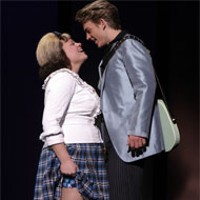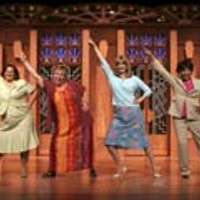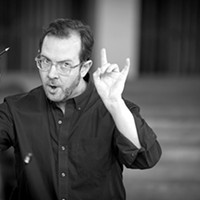There are few scores in all the literature that are more familiar and beloved. Verdi doles out choice arias and/or narratives to all four of his principals -- and one of their lieutenants! Two mighty choral pieces stir the blood, the spirited call to battle by the Count di Luna's soldiers in Act III and the oddly patriotic "Anvil Chorus" sung by the Gypsies at the start of Act II. Toss in the 108th US Army Reserve presenting the colors as the Charlotte Symphony pours out the National Anthem, and you have a rousing, crowd pleasing evening of music.
Aside from a welcome jolt of box office appeal, Trovatore is more relevant now than it has been in nearly 60 years. Here is a timely reminder that bloodthirsty vengeance, blinding passion, tribal animosity, and murderous jealousy are rooted in antiquity. There's no virulent religious zeal in Verdi's melodrama -- and the weaponry is decidedly low-tech -- but there's plenty of senseless carnage in the trashy storyline.
The fulcrum of this turgid tale set in medieval Spain is the mad, vengeful Gypsy woman, Azucena, daughter of a conjurer burnt by di Luna's father at the stake. (Note to Spanish rulers: It's bad business to incinerate Gypsy conjurers.)
Azucena launches her vendetta by kidnapping di Luna's baby brother. Then, prompted by a vision of her martyred mom, she tosses the little boy into the same flames that consumed Mama. But wait! That was Azucena's baby tossed into the flames, following his grandma heavenward. Oops.
Azucena raises little Manrico as if he's her own, loves him ardently, until he grows up and, by some malign twist of fate, falls in love with the same beautiful lady-in-waiting his older brother adores.
So as the curtain rises, Azucena is the frenzied wildcard hovering above the love triangle of Manrico, the Count, and Leonora. Amid an ongoing civil war, it is Manrico's love for his faux mom that makes him vulnerable when the Count captures and imprisons Azucena. And it's Azucena who holds the secret -- until the opera is nearly done -- that the two rivals are brothers.
Watching Manrico expire and facing her own death at the hands of di Luna -- all her mothering and nursing seemingly in vain -- Azucena exults! "He was your brother! My mother is avenged!"
It makes even less sense when you watch it all live. But hearing the OC production was often heavenly, as it should be. Susan Foster was particularly impressive as Leonora in Act I, Scene 2, soaring rapturously through "Tacea la notte," recounting how she fell for the mysterious troubadour who has returned to serenade her after years in exile. She was nearly as compelling singing "D'amor sull'ali rosee" at the top of Act IV, preparing to sacrifice herself to di Luna to save her beloved's life.
Wobbling vocally all over every anguished Azucena outcry, mezzo Sondra Kelly acted superbly as the flaky Gypsy. Perverse as this judgment might be, I loved the contrast between Foster's pearlescent soprano and Kelly's crazy quaver.
But our leading men weren't as consistent in meshing acting and singing. You could hear the sobs in tenor Jeffrey Springer's voice as he longed for Leonora and agonized over Azucena's capture. But physically, as a lover and a soldier, Springer was a stiff. Baritone Mark Rucker, on the other hand, immersed himself so thoroughly in the seething resentments of di Luna that he occasionally forgot to sing, barking out whole lines of the same note. When he did bother, anguishing over his unrequited love in Act III, Rucker drew the most enthusiastic ovation of the night.
Sets leased from the Opera Company of Philadelphia were only marginally better than the drab mess that housed Susannah. Scene changes were quieter, and the painted scrim (El Greco as re-imagined by Cezanne) coupled with Michael Baumgarten's mottled lighting helped -- until about the third time these effects were repeated.
Stage director Michael Capasso kept most of his singers alert to the nuances and passions of the turgid libretto, but combat director Dale Girard must have despaired in his attempts to get Springer and Rucker to mix it up. Their swordplay was ridiculous.
Aside from one tardy entrance, the OC chorus was superb, and Charlotte Symphony provided empathetic support all evening under James Meena. I was particularly impressed with the clear expressive woodwinds before Leonora's surrender and the foreboding density of winds and strings before the final prison scene.
Lots of outstanding singing and outstanding music. Now if we could just get OC to rise to the design level of NC Dance Theatre's Cinderella -- or simply to depend on local stage designers -- their whole package could be outstanding.
Considering the lamentable shortage of world-class chamber music groups on Charlotte's concert calendar, I'd say that the solid Chamber Series at Winthrop University is a secret that's being kept all too well. Kicking off the 2001-2002 season down in Rock Hill last Saturday night, Red Priest was billed as "an outrageously different Baroque ensemble!"
To the legion of bluehairs and university students in quest of cultural credit who dominated the crowd, perhaps the quartet was outrageous. Leader Piers Adams came out with a satchelful of recorders ranging in size from smaller than a piccolo to about the length and width of an anorexic teen's amputated leg.
Costumes had a flamboyant antique flavor. Cellist Angela East sported a jacket that evoked Merlin, violinist Julia Bishop darted around in a gauzy get-up reminiscent of the Weird Sisters in Macbeth, Adams' garb combined elements of Robin Hood and court jester, and harpsichordist Howard Beach was pure Wayne Newton.
Stuffy concertgoers may have been affronted during the rendition of Robert Johnson's The Witches' Dance, when the group punctuated their playing with wicked cackling. They may have sighed when Adams and Bishop circled the audience playing a Henry Purcell Canon.
'Twas more education than sacrilege. While Bishop maintained a distance of two rows behind Adams as they passed down the aisles, she was also a consistent two bars behind the recorder in the melody, beautifully illustrating how canons are constructed.
Like the spike-haired violin whiz Kennedy who stormed into the PAC a couple of seasons back, Red Priest is guilty of no worse abomination than having fun. Taking their name from Antonio Vivaldi's moniker, Red Priest boasts a synchronicity that is as breathtaking as their virtuosity. These core elements leaped out at us in the opening piece, Red's Concerto Grosso in A Minor. The sudden shifts in tempo were a marvel, and the fastest were insane. Yet the group was always together.
Adams had the showiest virtuosity, but I was nearly as impressed with East on her 1725 cello. At times she'd stand and bow, filling the hall with mellow sound. On Diego Ortiz' Two Recuerdas, she hoisted the instrument and strummed it like a guitar. And on the evening's finale, a Fantasia by Corelli, she played hot pizzicato licks like a bassist in a jazz combo. Extraordinary.
You have plenty of time to check out the Chamber Series before the next installment. The Brazilian Guitar Quartet, featuring Grammy nominee Paul Galbraith, is slated for Tuesday, January 29, and the St. Petersburg String Quartet performs a week later. The Rock Hill/York County Arts Council, 803-328-2787, lines up the talent.
In the case of Red Priest, here's hoping the PAC and Spirit Square do the same. *
Speaking of Arts_performance.html
-

Sailing With Hamlet
Jul 20, 2005 -

Proud To Be Plump
Jul 6, 2005 -

Putting The Sell In Cellulite
Jun 29, 2005 - More »
Latest in Performing Arts
More by Perry Tannenbaum
Calendar
-
An Evening With Phil Rosenthal Of "Somebody Feed Phil" @ Knight Theater
-
Kountry Wayne: The King Of Hearts Tour @ Ovens Auditorium
-

NEW WINDOW GALLERY-Pat Rhea-ACRYLIC PAINTINGS-April 05-30 2024 VALDESE, NC 28690 @ New Window Gallery/Play It Again Records
- Through April 30, 12 p.m.
-

Trap & Paint + Karaoke @ Zodiac Bar & Grill
-

LIVE MUSIC FRIDAYS!!! @ Elizabeth Parlour Room
-
Holiday Gift Guide
26 ways to shop local this holiday season
-
Fall Guide: Upcoming festivals, comedy shows, visual arts events and more
-
Halo 4 earns critical hallelujahs
Plus, news on Mass Effect Trilogy, LEGO: The Lord of the Rings














